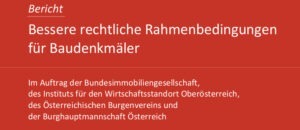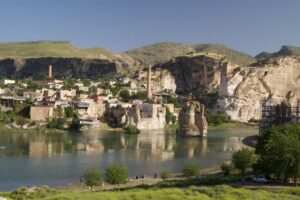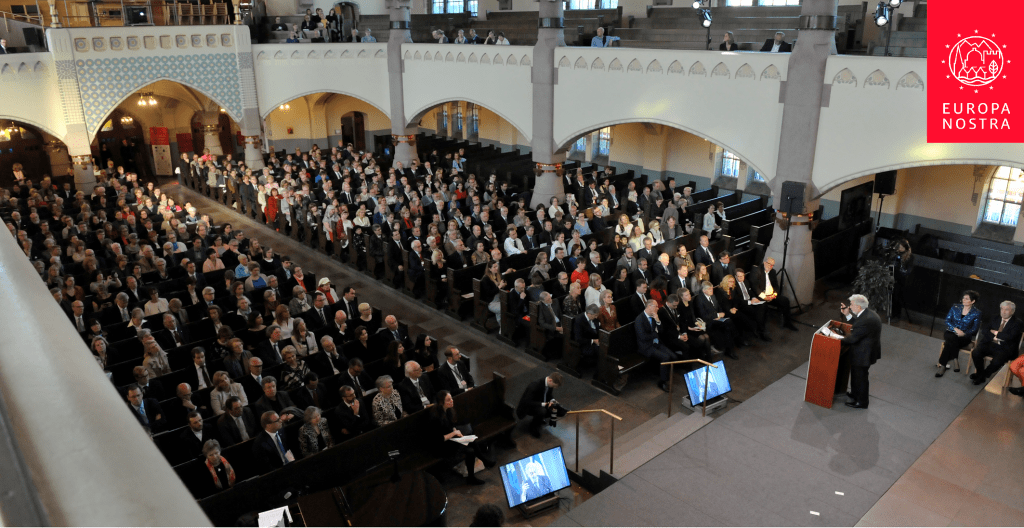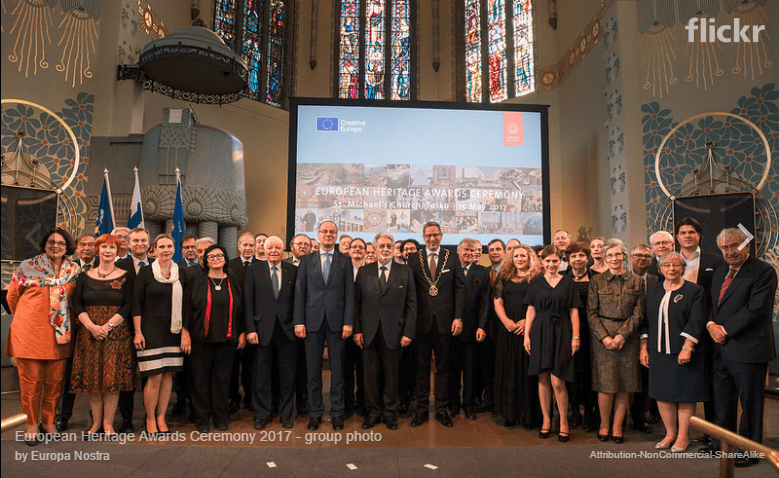Sing for Relief
TO THE ATTENTION OF ALL MEMBERS OF THE EUROPA NOSTRA COUNCIL AND BOARD
Dear Colleagues & Friends,
We wish to share with you the solidarity initiative taken by our President, Maestro Plácido Domingo, to mobilise the widest possible support for people in need in Mexico and Puerto Rico, two countries which have recently endured severe devastations and in which our President has many close family and friends.
Please take few minutes to watch and listen to the moving video message which our President has posted yesterday on his social media.
https://www.crowdrise.com/o/en/team/sing-for-relief
In this video message, Plácido Domingo urges us all to contribute an amount, however small, in support of people in need in those two countries. Our President has also pledged to match the amount raised through this initiative – up to the amount of 50.000 USD -through the Plácido and Marta Domingo Foundation.
Please also spread this message as widely as possible through your own contacts and also via social media.
Europa Nostra has already done this via our own twitter account.
On behalf of our President, we thank you in advance for your generosity and support.
With my very best regards,
Sneška
State of the Union speech
Europa Nostra’s reaction to President Juncker’s State of the Union speech
European Commission President Jean-Claude Juncker addressed the European Parliament in Strasbourg today in his annual State of the Union speech, taking stock of Europe’s political situation and outlining priorities for 2018, the year which coincides with the European Year of Cultural Heritage.
Juncker’s third State of the Union speech was delivered under the motto “wind in our sails”, calling the current situation a “window of opportunity” to shape the future of Europe. When outlining his “personal scenario number 6” for the future of the European Union, the EC President stressed his firm “love for Europe”: “Love for Europe because Europe and the European Union have achieved something unique in this fraying world: peace within and outside of Europe. Prosperity for many if not yet for all. This is something we have to remember during the European Year of Cultural Heritage. 2018 must be a celebration of cultural diversity”. The European Parliament welcomed the reference to the European Year with a strong applause.
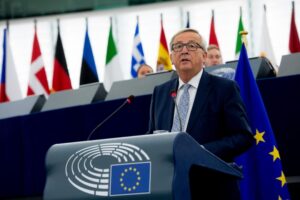
Benefiz zur Rettung der alten Hammerschmiede in Vils
Benefiz zur Rettung der alten Hammerschmiede in Vils
Historischer Kontext.
Der Weiler St. Anna in Vils besteht aus einem Bauernhaus, einer alten Hammerschmiede, der St. Anna Kirche und oberhalb am Berg steht die Burgruine Vilsegg
1861 besuchte die bayerische Königsfamilie mit Königin Marie das erste mal die alte Hammerschmiede bei St. Anna unterhalb der Burg Vilsegg in Vils. Es sollten über 140 Besuche in den nächsten Jahren in Vils sein.
Ludwig, der spätere König Ludwig II., soll als 16 jähriger begeistert mit seinem Bruder Otto in den alten Mauern der Burg Vilsegg „geklettert“ sein und von dort oben die alte Burgruine Vorder- und Hinterhohenschwangau (Doppelburg) in Schwangau gesehen hat. Er soll zu seiner Mutter gesagt haben: „Dort will ich einmal ein Schloss bauen.“ Schon 8 Jahre später begann er mit dem Bau von Neuschwanstein.
Der Besitzer der Hammerschmiede hat für die Königin im 1. Stock des Bauernhauses ein Zimmer in den Farben weiß – blau ausmalen lassen, an den Wänden waren Blumengewinde und auf der Decke ein Strahlenstern gemalt. Leider wurden diese im 20.Jh. übermalt.
Eintragungen der Königin im Gästebuch:
„Heute das erste mal einen Pflug zum Vergnügen geführt.“
„Nun auch zu buttern versucht.“
Besucher laut Gästebuch waren:
König Max II. , Königin Marie, deren Söhne Ludwig und Otto, die Prinzen Karl v. Hessen-Darmstadt mit Sohn Wilhelm, die bayer. Prinzen Adalbert, Arnulf und Leopold, die Prinzessinnen Elisabeth von Hessen-Darmstadt, v. Luitpold, Therese von Bayern und eine Spanierin, deren Gemahl Prinz Adalbert war, die Erzherzoginnen Gisela von Österreich und v. Österreich –Este, Fürst Thurn und Taxis, die Grafen Aggenheim, Alfred, Ernst und Friedrich Dürckheim, Max Holnstein, Edmund Maldeghem, Mals, Heinrich v. d. Mühle, Max zu Pappenheim, Albert Roth, Wilhelm, Zech , die Gräfinnen Alexandrine, Anna und Olga Dürckheim, Charlotte Fugger, Fugger zu Kirchheim, Therese v. Maldeghem, Julie v. d. Mühle, Emma v. Oberndorff, Voldermin, die Freiherren Wilhelm v. Branke, Max Laroche, v. Malsen, von u. zu Rhein, Joseph v. Schleitheim, die Freiinnen v. Kreußer, v. Limpurk, v. Reichlin und Luise v. Schäffer-Bernstein.
Vilsegg
Ein Graf als Denkmal-Pfleger
Ein Artikel über unseren Schatzmeister in der Samstagskrone Dr. Georg Spiegelfeld-Schneeburg
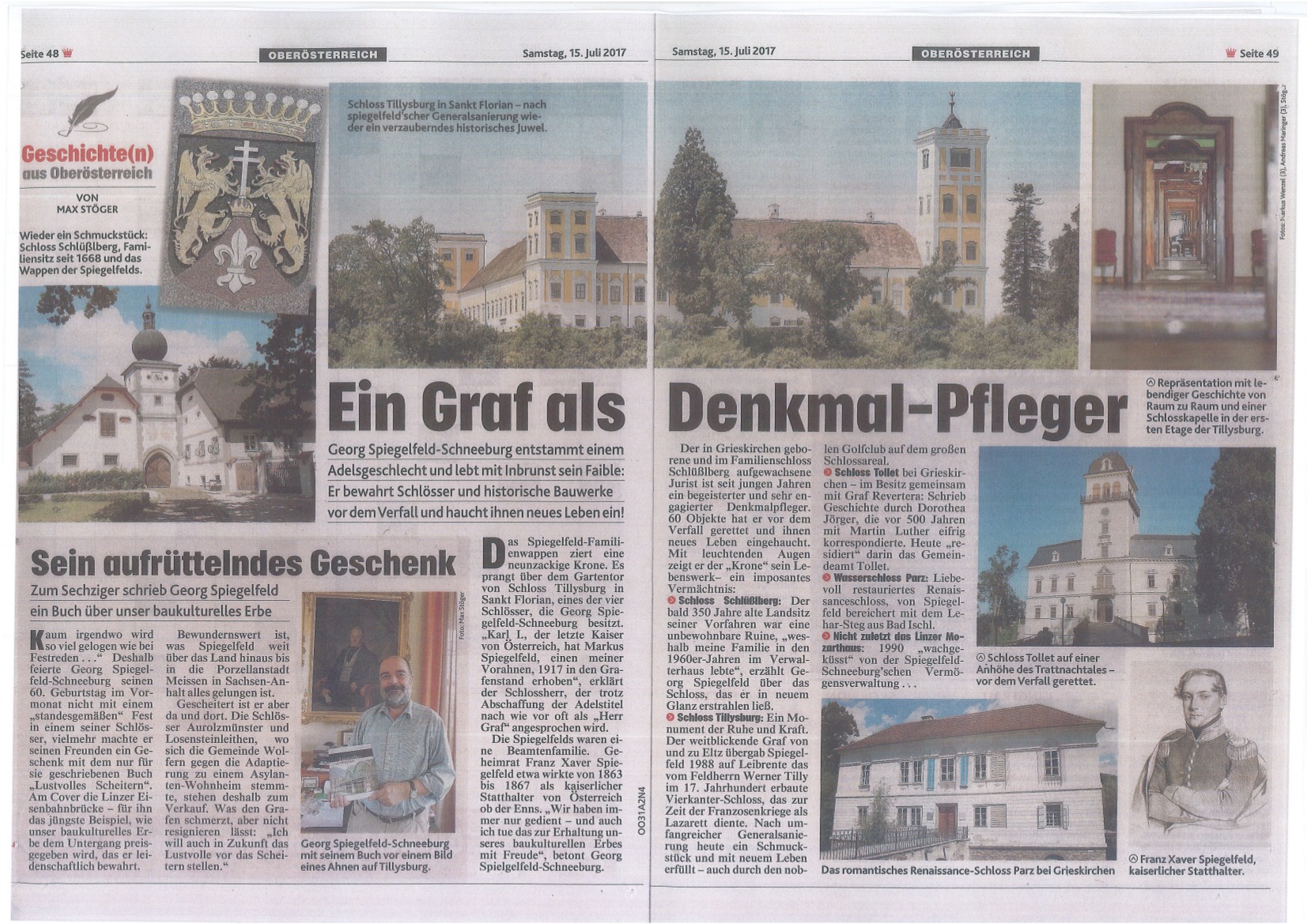
Malta’s heritage
Europa Nostra calls on Malta’s re-elected Prime Minister to make heritage preservation a priority.
On 14 June 2017, Europa Nostra’s Executive President and Secretary General sent a letter to the recently re-elected Prime Minister of Malta Joseph Muscat wishing him another successful term in office. Denis de Kergorlay and Sneška Quaedvlieg-Mihailović, also on behalf of Europa Nostra’s President Maestro Plácido Domingo, praised the impressive restoration projects of very high quality carried out in the country, particularly in Valletta, many of which with European support. They urged Prime Minister Muscat to put the preservation of Malta’s unique built and natural heritage as an urgent priority for his new government. The Executive President and Secretary General also reiterated that Europa Nostra stands ready to strengthen the cooperation with the Prime Minister’s office on heritage and cultural matters, especially in the framework of the European Year of Cultural Heritage in 2018.
ORF 2, KulturMontag
Sehr geehrte Mitglieder der Expertengruppe historische Bauten!
Bezugnehmend auf mein Mail vom Montag dieser Woche, darf ich Ihnen nunmehr den Link zur Sendung „ORF-KulturMontag“, mit dem Themenschwerpunkt „Über den Umgang der Republik mit historischem Erbe“ und anschließende Studiodiskussion zum „Nachsehen“ bekanntgeben: http://tvthek.orf.at/profile/Kulturmontag/1303/kulturMontag/13933659
Ich denke, es ist gut gelungen, die „Eigentümer-Frage“ im Zusammenhang mit dem Denkmalschutz in der Sendung zu positionieren.
Mit freundlichen Grüßen
Susanne Jenner
__________________________________
Land&Forst Betriebe Niederösterreich
Dr. Susanne Jenner
Geschäftsführerin
Schauflergasse 6/5, A-1010 Wien
T +43-1-533 02 27-14
F +43-1-533 21 04
e-mail: jenner@landforstbetriebe.at
Homepage: www.landforstbetriebe.at
Hasankeyf, Turkey
Europa Nostra’s Board gives statement on the endangered heritage site of Hasankeyf, Turkey
The Board of Europa Nostra, the leading heritage organisation in Europe, made a statement about theAncient city of Hasankeyf and its surroundings in Turkey, listed among the 7 Most Endangered heritage sites in Europe in 2016. In their statement, the Board of Europa Nostra deeply deplores the decision of the Turkish government to build a dam that would lead to the flooding of a site of world significance, without proper and transparent justification and without adequate compensation measures. In particular, the Board regrets that the removal of the Zeynel Bay Tomb has been carried out with insufficient consultation with the local and scholarly communities and that other Islamic monuments of great significance remain highly endangered. The Board of Europa Nostra urges the Turkish authorities to adhere to the standards of heritage protection that are included in the European Conventions and to set up a proper consultation process with local communities and civil society organisations concerned in an open and transparent manner. Weiterlesen
Nostra’s European Heritage Congress 2017 in Turku, Finland.
To all Delegates of Europa Nostra’s European Heritage Congress 2017 in Turku, 11-15 May
Dear All,
On behalf of the Board of Europa Nostra and the International Secretariat in The Hague and in Brussels, and also on our personal behalf, we would like to thank you for your active participation and contribution to our European Heritage Congress in Turku. We very much hope that you appreciated and benefited personally and professionally from the various events and networking opportunities organised during our Congress, with the invaluable cooperation of Europa Nostra Finland, our country representation in Finland. We particularly wish to extend our heartfelt thanks to Tapani Mustonen, Anna-Maija Halme and Benito Casagrande. We also wish to thank the City of Turku for an extraordinary welcome and support, the Turku Music Festival Foundation, the Luciano Pavarotti Foundation and the Matti Salminen Foundation for enriching our Awards Ceremony with an inspiring musical programme as well as numerous partners and supporters from Finland and other European countries.
We are proud to share with you a selection of Congress photos and videos, that you can view and download via our Flickr and YouTube channel’s.
We especially wish to draw your attention to the short video with the highlights of our memorable Awards Ceremony and to the full version of the ceremony video which is available on our YouTube channel.
We invite you to visit our new website for congress related news and follow our social media channels (Twitter & Facebook). We would very much appreciate if you could help us to spread actively our news especially with regard to the European Year of Cultural Heritage in 2018.
IMPORTANT:
Last but not least, we thank you in advance for filling in our online Evaluation Questionnaire.
As the organisation of the European Heritage Congress is one of the key activities of Europa Nostra’s EU-funded network project “Mainstreaming Heritage” (2014-2017), it will help us provide a sound evaluation and final report of the overall project to the European Commission. Thanks to your valuable feedback, we shall also be able to continue improving the quality of our congresses and service to our delegates.
Thank you for your cooperation and for your continuous support and input to Europa Nostra’s action in favour of Europe’s cultural heritage.
We look very much forward to welcoming you to Europa Nostra’s European Heritage Summit next year in Berlin or to one of our forthcoming events in preparation of and during the European Year of Cultural Heritage in 2018.
Sneška Quaedvlieg-Mihailović,
Secretary General
&
Barbara Zander
The Hague Office Coordinator
European Heritage Awards 2017
Plácido Domingo and EU Commissioner Navracsics announce Grand Prix winners of the European Heritage Awards 2017 in Turku
Turku, 15 May 2017 – The winners of the 2017 EU Prize for Cultural Heritage / Europa Nostra Awards, Europe’s top honour in the field, were celebrated this evening during a high-profile event at St. Michael’s Church in Turku, Finland. Maestro Plácido Domingo, President of Europa Nostra, the leading heritage organisation in Europe, and Tibor Navracsics, European Commissioner for Education, Culture, Youth and Sport, co-hosted the European Heritage Awards Ceremony. They announced and presented the 7 Grand Prix and the Public Choice Award, chosen from among the 29 winning achievements of this year.
The 7 Grand Prix laureates, selected by an independent jury of experts and entitled to receive €10,000 each, are:
Category Conservation
Baroque Complex and Gardens in Kuks, Hradec Králové Region, CZECH REPUBLIC
The King’s Road across Filefjell, NORWAY
Cultural Palace, in Blaj, Transylvania, ROMANIA
Roof for the Ruins of the Monastery of San Juan,Burgos, SPAIN
Category Research
Bosch Research and Conservation Project, ‘s-Hertogenbosch, THE NETHERLANDS
Category Dedicated Service
Mr. Ferdinand Meder, Zagreb, CROATIA
Category Education, Training and Awareness-Raising
Centre of Visual Arts and Research, Nicosia, CYPRUS
The Public Choice Award, which is in its sixth edition, goes to Mr. Zoltán Kallós, who has devotedly compiled collections of music, dance, storytelling and crafts of the Hungarian, Romanian, Saxon and Roma communities of Transylvania in Romania for over 70 years. It is the first time that an accomplishment in the category Dedicated Service to Heritage obtains the highest number of votes. 11,500 people voted for their favourite heritage achievements in Europe via an online poll conducted by Europa Nostra.
During the ceremony, the EU Prize for Cultural Heritage / Europa Nostra Awards were presented to 29 winners from 18 countries taking part in the EU’s Creative Europe programme. In addition, two exemplary projects from Switzerland and Turkey, European countries that are not participating in that programme, also received a Europa Nostra Award.
“It has been an enormous privilege to meet and honour all Award winners in the beautiful historic city of Turku on the occasion of Finland’s 100th anniversary of independence. Each winner is a shining example for all of us who care and work for our common heritage. Our Awards Ceremony and Congress in Turku was also the perfect occasion to mobilise our award winners, members and partners to actively contribute to the European Year of Cultural Heritage in 2018. We must not miss this historic opportunity to put our shared cultural heritage where it belongs – at the very heart of the European project which we need to revive!” stated Plácido Domingo, the renowned opera singer and President of Europa Nostra.
“Once again, the EU Prize for Cultural Heritage / Europa Nostra Awards celebrate the talent of excellent craftspeople and professionals, the tireless work of volunteers, and the devoted efforts of educators, who ensure that our cultural heritage can be enjoyed today and safeguarded for future generations. Europe’s cultural heritage is one of its most valuable resources. Its value is not just symbolic – it has a positive impact on our quality of life, on our economy and on our society. I am delighted that 2018 will be the European Year of Cultural Heritage. This is a great opportunity to make EU citizens from all backgrounds aware of the value of our shared cultural heritage, the risks it faces and the opportunities it offers for fostering social inclusion and building the communities of the future,” said Tibor Navracsics, European Commissioner for Education, Culture, Youth and Sport.
The Awards Ceremony in Turku was attended by some 1,200 people, including heritage professionals, volunteers and supporters from across Europe as well as top-level representatives from EU institutions, Member States and the host country.
The Awards Ceremony was the closing public event of the European Heritage Congress that has brought hundreds of heritage players from all over Europe to Turku on 11-15 May. Organised by Europa Nostra and its country representation Europa Nostra Finland, the Congress was supported by the City of Turku, numerous public and private bodies from Finland and other European countries as well as by the Creative Europe programme of the European Union.
In 2018, the EU Prize for Cultural Heritage / Europa Nostra Awards will be used as a pivotal instrument for promoting the key objectives and messages of the European Year of Cultural Heritage. The Call for Entries 2018 for this Special Edition of the Awards Scheme will be posted on 1 June 2017 on the Awards website: www.europeanheritageawards.eu/apply

